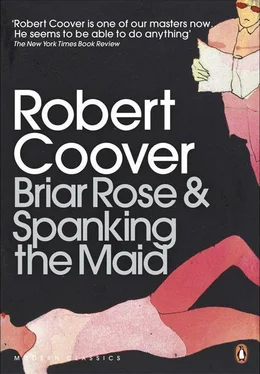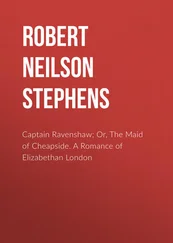Not true; though, true, it’s what she’s best at, feelings and perceptions the very gestures of her intimate art, the foolish passions of the world-beguiled what best she can get her iron teeth into. But the prison of the flesh is not her only theater, the wheel of sensuous agony and delight not her one and only turn. She is also, in her waggish way, a devotee of the higher learning, an interpreter and illuminator, concerned with truth and goodness and, above all, beauty, the mind her stories’ true domain, body merely their comic relief. Though reputed to carry a sack of black cats on her back and to delight in slitting open the tums of indolent girls and stuffing them up with scurf and rubble, she prefers in fact to provision their desolate heads, ravaged by ignorance and sentiment, and what she carries on her back, alas, is the weight of eternity, heavy as a cartload of cowshit. A mere hundred years? It’s nothing, you ninny, she replies to the sniveling dreamer, really you are one of the lucky ones. And she tells her the story of the princess chained to a rock thousands of years ago (it seems like only yesterday!) and guarded by a fire-breathing sea monster, who could never understand why this wailing creature, so ruinously chafed by wind and tide, should be thrust upon him like some kind of unanswerable riddle. Well, nothing to do but eat the bony little thing, he supposed, compelled less by appetite than by the mythical proprieties, and he was just tucking dutifully in when a prince turned up intent on rescue, so the dragon asked him in effect the question you have asked. He, too, had no sequential memory, knew only that he was born, so they said, of chaos, she of love, and thus they were cosmological cousins of a sort, and should bear no grudge against one another, so how had they arrived at this moment of mortal encounter, which seemed more theoretical in nature than practical? The prince, well schooled, was interested in this question, touching as it did on the sources of the heroic quest, about which he too sometimes had his misgivings, but the dragon’s breath was so hot and noxious all he could do was gasp that it not only always comes down to a family story in the end, but it’s always the same one. The monster gaped his jaws in awe of this wisdom and the prince fired a fatal arrow down his throat and into his doubting heart. And they lived happily ever after? How could they, the dragon was dead. No, I mean the princess and the — Oh, who can say? The prince had other tasks and maidens to attend to, making a name for himself as he was, for all I know, my dear, that one’s chained there still.
Inextricably ensnared in the briars, yet never ceasing to resist (he will remain a hero to the end), he attempts to conjure up an image of the legendary princess who waits inside (but not for him), hoping to assuage his terrible pain and disappointment and stay his rising panic, but it is not her incomparable radiance and beauty that appear to his imagination but more cadaverous traits: her deathly pallor, sunken flesh, crumbling gown, her empty eye sockets. And the ghastly silence that reigns over her. Oh no! Too late! He wets her shrunken bosom with his tears, strokes her cold cheeks, gazes with horror upon her dreadful inertness. He turns her over: her backside is eaten away, crawling with worms and — no, he does not turn her over! He hacks desperately at the brambles and, as the hedge closes round him like the grasping flesh-raking claws of an old crone, imagines instead her dreams, sweet and hopeful and, above all, loving: loving him who is to come, slashing through the briars and scaling the castle walls to reach her bedside with his spellunbinding kiss. She does not yet dream of that dream-dissolving kiss, however, but rather of his excitement when he discovers her there in all her resplendent innocence, her unconscious body at the mercy of his hungry gaze and impassioned explorations before he quickens it with his kiss, his excitement and her own unwilled passivity before it exciting her in turn, making her eager to awaken and not to awaken at the same time, so delightful is this moment, though of course, he may not be there yet, it is no simple matter to scale the sheer walls of the castle, many have fallen, and once inside he might get lost in the maze of halls and stairs and corridors, not knowing for certain where to find her, and there might be other sleepers along the way who attract his kisses, not to mention his excited explorations, delaying him until it is too late, and even before he can get to the walls there is the infamous briar hedge, noisy with the windblown clatter of bones, the bones of those for whom commitment to love, adventure, honor, and duty and a firm sense of vocation were not enough, their names unmade, forever-aftered into the ignominious anonymity of the nameless dead. No! he cries. Don’t just lie there! Get up! Come help!
Her charge has just emerged from a nightmarish awakening in which she was kissed by a toad and turned into one herself and as usual has come running, so to speak, to the fairy, who is calming her with a tale about a beautiful young princess who got pricked one day by a spindle and fell asleep for a hundred years. Have I heard this story before? Hush, child. When she woke up, she found two little babies suckling at her breasts, and one of them — Babies—?! Yes, it seems that her prince, or some prince anyway, had been visiting her person regularly over the years, and these— But didn’t the prince kiss her? Didn’t he break the spell and wake her up? Well, he may have, I don’t know, that’s not part of this— But that’s terrible! Already she had these babies and she didn’t even know if she’d been kissed or not—?! I hate this story! All right, wait a minute, let’s say he did. He came into the room, greeted the fairies, played with little Dawn and Day, and kissed the princess. That’s it? Now what’s wrong? It doesn’t sound right. It’s not like a real story. What do you know about it, you little ninny? snaps the fairy, picking up one of the children and smacking its bottom to, making her point, make it cry: Whose story is this anyway? Rose takes the baby away from her and cuddles it. You really are very wicked, she says, rocking the baby gently in her arms to stop its screaming, and the fairy cackles at that. You’re right, she says, when she woke up there weren’t any children, that’s a different story. Rose stares confusedly into her arms, now cradling empty air. I don’t mind, she says timorously, you can leave the babies in if you want. No, no, there were no babies, forget that. Beauty woke up and found not one prince beside her bed, but three: a wizened old graybeard, a leprous hunchback with a beatific smile, and the handsome young hero of her dreams. Which one of you kissed me awake? Beauty asked, looking hopefully at the pretty one. We all did, replied the oldtimer in his creaky voice, and now you must choose between us. Take the holy one, he said, pointing to the scurvy hunchback in his haircloth, and your life will be lost to the self deceiving confusions of human compassion; take the other and you must live all your life with lies, deceit, and unrestrained wickedness. That may be true, old man, said the beautiful one with a snarling curl of his lip, but at least I’m not so hard of heart as you. And I live in the real world of the senses, not some chilly remote tower of the mind. Look at this! He stripped off his princely finery and, with a flourish, watching himself in a round gilt-framed mirror on the wall, struck a pose worthy of the great classic sculptors, with that funny thing between his legs hopping like a frog. Ah, but remember, said the leper, opening his robes and, as though in parody, peeling off a wafer of flesh from his diseased chest, physical beauty is only this deep and lasts but a brief season, while spiritual beauty lasts forever. So tell me, my love, says the fairy, scratching her cavernous armpits, which did Sleeping Beauty choose? Oh, I don’t know, whines Rose, and I don’t care. You’re just making my head ache. Tell me about the babies again.
Читать дальше












